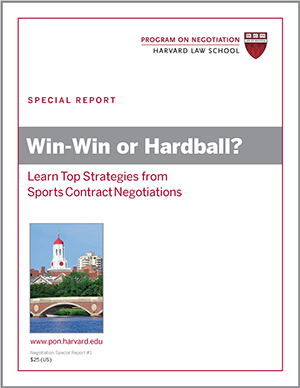
From movie moguls hammering out film deals in Los Angeles to publishers and agents assessing each other’s tastes in New York, the “power lunch” has become a familiar institution. Across the globe, negotiators often do business over shared meals, whether out of convenience or as part of a concerted effort to get to know one another better. The belief has always been that food helps create a win-win situation, and furthermore, a win win negotiation.
Are we correct in assuming that dining together creates a communal spirit that leads to better deals? Not entirely, according to Stanford Graduate School of Business professor Margaret Neale and doctoral student Peter Belmi. In a study, the researchers found that whether we are likely to reap benefits from negotiations conducted in the presence of food depends on the type of bargaining situation we are facing—as well as the way the food is served.
Neale and Belmi told negotiators they were facing either a competitive situation or a cooperative one. Some pairs were given food to share while they negotiated; other pairs were given individual portions of food. (Apples and caramel sauce were used in one experiment, and chips and salsa in another.)
Interestingly, for those facing a competitive negotiation, shared food, but not individual portions, helped them create significantly more value – a hallmark of a win win negotiation. By contrast, those facing a cooperative situation created less value when given food to share.
Why the difference? Neale and Belmi theorized that the juxtaposition of a social ritual that suggests cooperation—namely, shared food—creates a disconnect with the task of negotiating competitively. That disconnect inspires people to pay more attention to one another and look for opportunities to create value.
Meanwhile, when negotiators are focused on cooperating with one another, shared food can create a relaxed, familiar atmosphere. Consequently, negotiators may become more concerned about maintaining a friendly relationship than with achieving a win-win situation.
The results suggest that when you are dealing with a particularly competitive negotiator, looking to break an impasse, or dealing with conflict, it might be a good time to pass some appetizers or visit a restaurant where it’s common to share dishes – Spanish tapas, Ethiopian food, or Asian cuisines might be good choices. But in negotiations with someone you know well, you might pass on eating entirely or at least order your own food.
The study results serve as a reminder that negotiation advice is not “one size fits all.” Often, what works in one situation will be the wrong choice in another. Always take time to think about the potential challenges you are likely to face at the table before negotiating the process itself.
Do you think the presence of food can create a win win negotiation?
Related Posts:
Article: Negotiation and Nonviolent Action: Interacting in the World of Conflict
The Art of Deal Diplomacy
Dealmaking Negotiations: How to Build Trust at the Bargaining Table
Negotiation Skills: Are You Really Ready to Negotiate?
Dealmaking: Top Ten Business Deals of 2013
Originally published in 2014.





In East Africa, where I work, it is considered extremely rude to jump right into negotiations as soon as you get together. You have to allow time for small talk, relationship building and measuring each others’ attitude, figuring out who the most senior person in the room is, etc. before you can get to the topic of a meeting. The higher the stakes, the more time you have to allow. You have to be very patient to not loose your cool even before the negotiations have begun. So sharing a meal in the beginning of negotiations is a very good way to not be too awkward, if you are not used to this kind of behavior.
Although having lunch is practically everyone’s culture, we in Papua New Guinea call this type of negotiation “The Melanesian Way” and we assert that such a power lunch (or dinner) is precisely how our country’s forefathers obtained a peaceful independence 100% free of blood shed. Shared-eating brings about a common ground, and helps parties remember that we are all human after all, despite our numerous differences. Every discussion involves a meal in PNG, which is how a country of 800+ different cultures and languages manages to find common ground and move as one body
In some national Cultures, food is typically shared.
Do those National Cultures avoid negotiating over shared food, out of fear to become too cooperative?